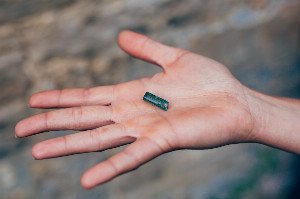Mochamad Malik Akbar, Nadia Meirani, Rezi Muhamad Taufik, Eka Tresna
Optimizing Artificial Intelligence (AI) in Empowering the Creative Economy of the Community Through the Development of Potential Halal Products
Introduction
Optimizing artificial intelligence (ai) in empowering the creative economy of the community through the development of potential halal products. Discover how AI optimizes halal product development, empowering the creative economy. Learn about a university program using AI tools like ChatGPT & Canva to boost entrepreneurial readiness, achieve business legality & IP.
Abstract
Entrepreneurship is a strategic issue in community service due to its role in reducing unemployment and promoting innovation-driven economic growth. Universitas Islam Bandung, through the Management Study Program, implemented the Entrepreneurship Development Program (PPK) to address students’ low entrepreneurial interest and readiness. Designed with a participatory and collaborative approach, the program involved students actively in recruitment, training, and intensive business mentoring. A distinctive feature of this program was the integration of artificial intelligence (AI) as a supporting tool. Applications such as ChatGPT and Bard were used for market research and business idea validation, while Canva, Pictory.ai, and Gamma.app supported digital content creation to enhance branding and customer engagement. The program achieved notable results: all participating tenants successfully obtained business legality (NIB and certification), produced intellectual property-protected products, and published scientific articles with media exposure. The initiative was further strengthened by collaboration with HIPMI PT, contributing to the development of a campus-based entrepreneurial ecosystem. These outcomes demonstrate that a practice-based approach combined with continuous mentoring is effective in improving students’ entrepreneurial motivation, readiness, and intention, while also supporting the achievement of key performance indicators at the university level.
Review
This paper presents a highly relevant and timely initiative, focusing on the critical role of entrepreneurship in fostering economic growth and empowering communities, particularly through the lens of halal product development. The program's design, emphasizing a participatory and collaborative approach, directly addresses the pertinent issue of low entrepreneurial interest and readiness among students. A standout strength is the deliberate and strategic integration of cutting-edge AI tools, which adds a contemporary and innovative dimension to traditional entrepreneurship development methodologies, aligning well with the broader objective of optimizing AI for the creative economy. The abstract effectively outlines the practical methodology, involving active student engagement in recruitment, training, and intensive business mentoring. The specific mention of AI applications like ChatGPT, Bard, Canva, Pictory.ai, and Gamma.app for market research, idea validation, and digital content creation provides concrete examples of how technology was leveraged to support the entrepreneurial journey. The reported outcomes are notably impressive and tangible: all participating tenants successfully acquired business legality, produced intellectual property-protected products, and published scientific articles with media exposure. The collaboration with HIPMI PT further underscores the program's success in fostering a robust, campus-based entrepreneurial ecosystem. While the abstract successfully demonstrates the program's efficacy in fostering entrepreneurial readiness and achieving significant outcomes, future discussion or the full paper could benefit from a more explicit delineation of how AI specifically "optimized" the *halal product development* aspect, as indicated in the title. The abstract currently focuses broadly on AI's role in entrepreneurship. Additionally, insights into any challenges encountered during AI integration and their resolution would further enrich the practical understanding of the program's implementation. Nevertheless, this paper offers a compelling case study for an effective, practice-based approach to entrepreneurship education, significantly enhanced by technological integration, providing valuable insights for institutions aiming to cultivate innovation-driven, community-focused entrepreneurial ecosystems.
Full Text
You need to be logged in to view the full text and Download file of this article - Optimizing Artificial Intelligence (AI) in Empowering the Creative Economy of the Community Through the Development of Potential Halal Products from Jurnal Pengabdian Tri Bhakti .
Login to View Full Text And DownloadComments
You need to be logged in to post a comment.
Top Blogs by Rating
The Silent Language of Your Bo...
By Sciaria
Andragogy: The Secret to Engag...
By Sciaria
The Data Diet: What Big Data *...
By Sciaria
Favorite Blog
Beyond Repair Shops: Unlocking...
By Sciaria
The Collective Gasp: Why Live...
By Sciaria
Your DNA's Ancient Story: Unlo...
By Sciaria
Related Research
Pengaruh pengungkapan laporan keberlanjutan terhadap nilai perusahaan pada perusahaan sub sektor perbankan yang terdaftar di bei periode 2020-2022
Application of digital pattern techniques in ready to wear fashion based on clo3d software
Follow the money or follow the prince
Share
Notice Board
- SPATIAL MODEL OF GEOGRAPHIC DISTRIBUTION OF LEPROSY CASES IN EAST JAVA PROVINCE, INDONESIA
- PENGARUH PERBEDAAN KOMPOSISI RUMPUT LAUT EUCHEUMA COTTONII DAN ULVA LACTUCA TERHADAP KUALITAS NORI
- ENVIRONMENTAL HEALTH RISK ASSESSMENT OF CONSUMPTION OF FOODSTUFFS CONTAINING ORGANOPHOSPHATE RESIDUES AMONG FARMERS





